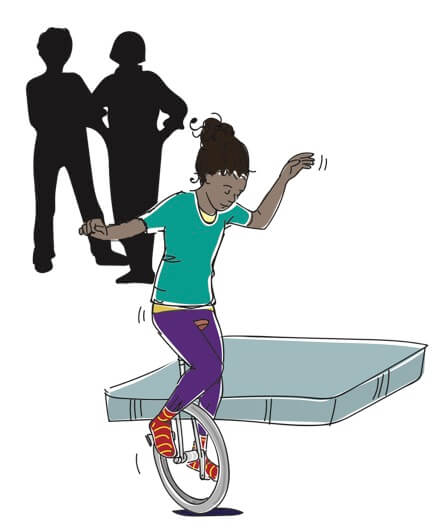ABC of INQUIRY – INDEPENDENCE
ABC of INQUIRY – INDEPENDENCE “The world is a very puzzling place. If you’re not willing to be puzzled, you just become a replica of someone else’s mind.” Noam Chomsky
INDEPENDENCE: To explore what you can do…
Being independent is defined by dictionaries as being free from outside control, self governing or capable of thinking or acting for oneself. Within a class or learning community, supporting learner independence is about providing support and frameworks that enable learners to make choices that are age appropriate and within the range of the learners’ abilities.
When teachers talk about a learner being independent, it is about recognising that the learner has developed skills, attitudes and understandings they can use to experiment or test ideas without constant supervising support. However there still need to be scaffolds, boundaries and support systems in place to back the leaner up as they explore and develop skills in thinking or acting for themselves. Reflection opportunities are also critical for the learner to make visible to self and others what skills, ideas, attitudes they developed in any particularlearning process. Independent learners do not work in isolation or on their own, they still work in social and collaborative situations. Independence refers to a learners ability to self govern and make choices and their ability to respond (being responsible).
Pearson & Gallagher (1983) introduced the idea and phrase“gradual release of responsibility” to describe the process learners go through as they move from needing help governing choices to being independent in their thinking and acting. In this model the teacher or mentor holds the initial responsibility to help make and guide the choices and in some cases direct and limit the choices. During this heavily guided phase the teacher should make the teaching and learning visible so the learner can develop an awareness of the what, why and how of the learning process. This is often done in directed lessons, whilethis process slowly moves towards less teacher choice–making and more student agency. A process that moves from directed focus lessons to some differentiated guided instruction to collaborative mentoring and inquiry and then onto student driven independent inquiry.
Helping support learners become more independent requires of teachers and schools to be open to differentiated instruction and learning engagements. Teaching that supports learners becoming more independent is based in inductive or constructivist based teaching that values and has frameworks that allows learners to think, act and reflect and use mistakes as launch pads. It relies heavily on making the teaching and learning process visible and the negotiable and non-negotiable choicesvisible.
As learners move towards greater independence there is going to be mistake making. This in turn requiresthe need for reflection so that the learner gains increasedunderstandings about how to make informed decisions as they become more and more skilled at thinking and acting for themselves as they move towards becoming a self-governing adult learner. Vygotsky calls this transition from supported to self governing learning as the zone of proximal development.
To support learners in this transition teachers need to be aware of the prior knowledge learnersbring to each learning situation, so there is an awareness of what ideas, skills and attitudes are present and what ideas, skills and attitudes are missing or are based on misconceptions. From here teachers can make planning decisions about how much support or independence different students will benefit from at particularpoints inthe inquiry.The aim of teaching and learning that supports independent learningis about skilling up learners to be able to make informed choices sotheybecome self-governing learners, capable of thinking and learning for themselves in solo or collaborative situations.
*BCW will now use‘They,their — themself’ as a singular, gender-neutral pronoun in all subsequent material generated on our website.
All Rights Reserved © 2018 Beconwiz All ideas and illustrations are the property of BeConWiz.

BeConWiz Ideas and Thoughts by Carla Holmes, Mary-Denese Holmes, Pearl Holmesis licensed under a Creative Commons Attribution-NonCommercial-NoDerivatives 4.0 International License.
Based on a work at https://beconwiz.com.
Permissions beyond the scope of this license may be available at https://beconwiz.com.
